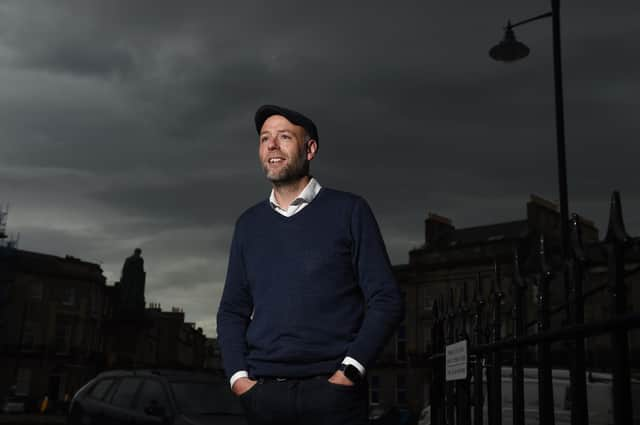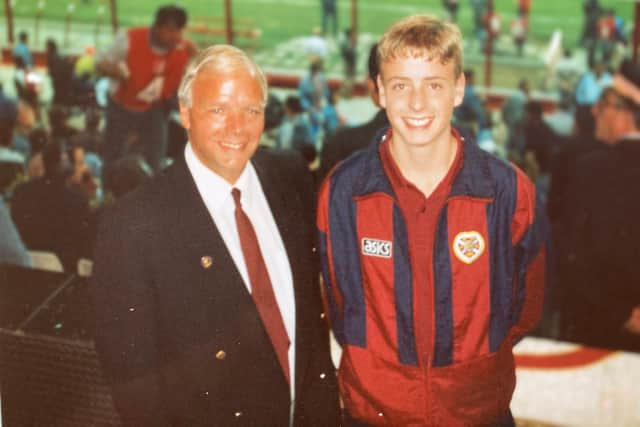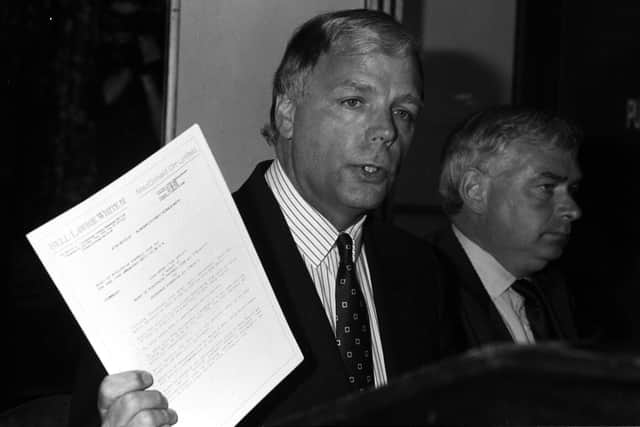Iain Mercer - son of former Hearts owner Wallace: 'I wish he wasn't remembered purely for Hibs merger episode'


Mercer junior recalls a poll from sometime in the late 1980s. “The three most famous people in Scotland were the Queen, Graeme Souness and Wallace Mercer,” he recalls. “It was that sort of level.
“Listen, he courted it,” he adds. “He loved the limelight and putting himself out there. You can’t put yourself out there and not expect to have to deal with it at the same time. I have applied similar traits in my own professional career. Some of it has rubbed off.
“I am a very different person.”


Advertisement
Hide AdAdvertisement
Hide AdIn athletic terms, that’s undoubtedly the case. As Mercer jnr explains, his father was many things to many people, but he was not, to his knowledge, ever a runner, long distance or otherwise. He was more likely to be found ordering another bottle of Beaujolais (it was the 1980s after all) in Cosmo, the upmarket restaurant in Edinburgh’s west end where important football as well as property deals were struck. Mercer straddled both these worlds.
His son has followed him into one of these spheres and is a director at Allied Surveyors.
As for sport, the 43-year-old Hearts season ticket holder is a doer as well as watcher. It’s one reason why he will find himself under the arch on White City Way at the start line of the Manchester Marathon this morning.
It’s his way of marking 15 years since Wallace Mercer’s death, in January 2006. The former Hearts owner passed away aged just 59 after a battle with liver cancer. Iain is raising money for Cancer Research, as he did when running his first marathon in Edinburgh in 2016 to mark the tenth anniversary of his father’s death. In between times has fallen another anniversary: 30 years since the momentous event that continues to cloud assessments of Mercer’s legacy.


The latest excuse to dredge up the events of 1990 arrived two summers ago. It’s always a trying time for the Mercer family, to the extent they have penned a family statement setting in print their side of the story for use on such occasions. It was released on the 20th anniversary of the merger attempt of Hearts and Hibs in 2010.
In it, Mercer senior’s widow Anne and Iain and sister Helen insist "sound football and economic reasons" had driven the momentum for a merger.
“It was considered that Edinburgh – a capital city and one of the great financial centres of Europe – punched well below its weight in football terms and that this was likely to continue while resources and loyalties were split between two clubs,” explained the statement.
“Subsequent events, with Rangers and Celtic tightening their stranglehold on Scottish senior football, have proved this to be right.”
Advertisement
Hide AdAdvertisement
Hide AdThe understandable frustration for Mercer junior and his family is that this episode, perhaps the biggest story in Scottish football prior to Rangers’ financial explosion, has eclipsed a lot of what else happened during the 1980s and early 1990s at Hearts, much of it good.
Now Hearts have been delivered into the hands of fans – Mercer jnr believes his father would have supported this development - it seems an appropriate time for a reassessment of the Mercer years.
A new main stand might dominate the skyline in Gorgie, but the rest of the stadium, reckoned to be among the most atmospheric in the land, stands as a monument to Mercer.
After the failure of the plan to create an “Edinburgh United” with a home at Straiton, he double downed on making improvements to Hearts’ own stadium.
“The club was spiralling when he bought it, close to bankruptcy,” says Iain, recalling when his father, who grew up on the west coast of Scotland, bought Hearts aged just 34. “There was a social problem on the terraces, a lot of trouble. It was endemic across British football at the time. That had to be gripped.
“A lot of the ideas he came up with to regenerate and completely change the face of the club were unique and trail-blazing at the time...First club to have a player-manager, introduce CCTV into the stadium… first club to have sponsors on the shirt and the first club to introduce a family enclosure, all things that are now commonplace, hospitality suites included.
“And they let the unemployed in for free as well, which I think was the idea of the vice-chairman at the time, Pilmar Smith, also no longer with us.
“That was around the time of the mining strikes, and closures and there was a lot of unemployment. And, of course, Hearts supporters were drawn from the likes of Dalkeith, Newtongrange and the pit areas, where there was a lot of unemployment.
Advertisement
Hide AdAdvertisement
Hide Ad“Don’t forget it was he who put in place the funding to begin the redevelopment of Tynecastle. Another innovative idea was the 500 Club which was to raise funds for the building of the Wheatfield Stand. When I was in my final year at school I worked on the construction site for three months over the summer and it was a summer job to get an insight into building and construction.
"What he didn’t get the credit for when he sold out to (Chris) Robinson and (Leslie) Deans was that all the funding was in place for the next phase of development and the Wheatfield stand of course was already built.”
On the field, of course, there were ups and downs. A home Scottish Cup defeat against Forfar Athletic early in Mercer’s tenure felt inauspicious but just a few years later, in 1986, Hearts were eight minutes away from winning the Scottish league title. No non-Old Firm team has since come so close.
Mercer's appointment of Alex MacDonald as player-manager was bold. They later fell out after MacDonald was sacked.
Successor Joe Jordan, meanwhile, suffered a “massive personality clash” with the owner, and left too. Mercer jnr was at Stewart's Melville college with the Jordan children at the time. Awks, as the kids didn’t say then.
He was also still at school – he was only 12 – when the merger story broke. Life would never be the same again.
“I wish he wasn’t purely remembered for that episode,” says Iain. “Again, and it’s on record, he admitted in an interview in 1994 that it was a great misjudgement and he had underestimated the social impact.
“He ended up doing Hibs a favour. It highlighted a significant problem they had with their own finances. But it caused a lot of grief and animosity which we had to deal with. So, in many ways yes, I wish that summer hadn’t happened. But you can’t turn back the clock.
Advertisement
Hide AdAdvertisement
Hide Ad“I remember the school was getting phone calls from the police. It was a mad period. Bricks through the window. Black box in the lounge with a panic button, which if pressed every squad car in west Edinburgh would be on our doorstep in about ten minutes.”
But that was then, this is now. “To be honest, there is not a week of my life that goes by when someone does not want to speak about him in very favourable terms, whether from a football or business perspective,” says Iain. “There is always someone who is speaking about how highly regarded he was and how they loved their time when he was chairman of Hearts or someone who did a property deal with him and loved this flamboyant character. He used the media to his own ends, to grow and promote the Hearts ethos and brand. There are few characters like him now.
“It was the end of an era.”
Sponsor Iain at https://www.justgiving.com/fundraising/iain-mercer2
Get a year of unlimited access to all The Scotsman's sport coverage without the need for a full subscription. Expert analysis of the biggest games, exclusive interviews, live blogs, transfer news and 70 per cent fewer ads on Scotsman.com - all for less than £1 a week. Subscribe to us today
Comments
Want to join the conversation? Please or to comment on this article.